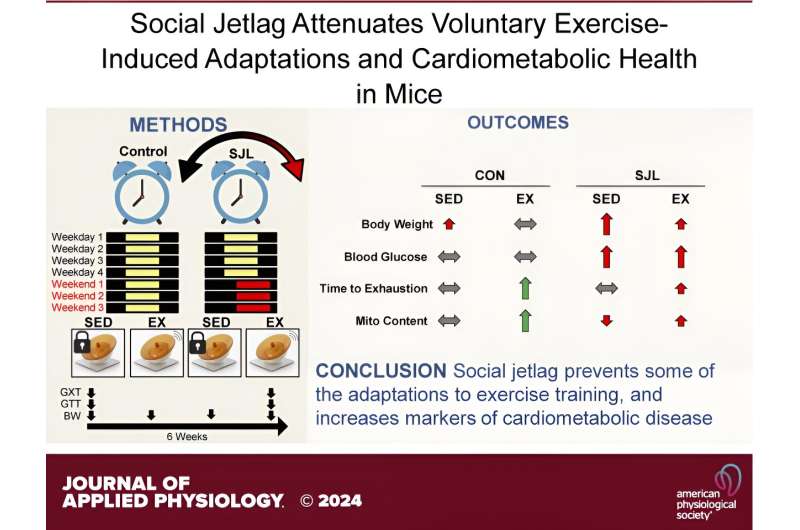This article has been reviewed according to Science X's editorial process and policies. Editors have highlighted the following attributes while ensuring the content's credibility:
fact-checked
peer-reviewed publication
trusted source
proofread
'Social jet lag' leads to weight gain and increased blood sugar in mice

Mice experiencing "social jet lag" developed characteristics similar to people with the same phenomenon, including significant weight gain, higher blood sugar levels and lower cardiovascular fitness.
Results of the study by researchers at the University of Nevada, Las Vegas, are published in the Journal of Applied Physiology. It has been chosen as an APSselect article for May.
Social jet lag is the consistent shifting of behavior, such as an earlier, shorter sleep schedule on weekdays and later, longer "catch-up" sleep on weekends. Previous studies show people who shift the timing of their sleep between work or school days and free days are at increased risk of being overweight and less fit, among other health issues. Social jet lag may also pose unique challenges for athletes and those participating in exercise training.
This six-week study looked at sleep and activity patterns in mice with four hours of social jet lag on weekends, then returned to normal on weekdays. This schedule resembles what happens when people stay up late on weekends while being active, eating and exposed to light, a key timekeeping cue for the brain.
In addition, half the mice were given a running wheel and allowed to exercise as much as they wanted. This allowed the research team to measure how social jet lag affects physical training. The mice with social jet lag ran less and gained less cardiovascular fitness compared to mice on a consistent light/dark schedule.
Another key discovery showed that while exercise prevented some harmful effects of social jet lag, fasting blood sugar levels still increased. These findings indicate a possible link between social jet lag-induced circadian rhythm disruption and cardiometabolic disease risk factors, such as high blood sugar.
Researchers say these results could have a direct correlation to improving human health, and further support the importance of sleep hygiene and circadian rhythm consistency. While this study was done in healthy mice, it will be important to translate these findings into mouse models with existing diseases or are at higher risk (i.e., obesity or hypertension).
"Since exercise is a frontline intervention to prevent and reverse cardiometabolic diseases, it is really important to determine how circadian rhythm disruption like [social jet lag] impacts the benefits of exercise in various disease states," said Graham Ripley McGinnis, Ph.D., an assistant professor of kinesiology and nutrition sciences and corresponding author of the study.
More information: Michael B. Dial et al, Social jet lag impairs exercise volume and attenuates physiological and metabolic adaptations to voluntary exercise training, Journal of Applied Physiology (2024). DOI: 10.1152/japplphysiol.00632.2023





















